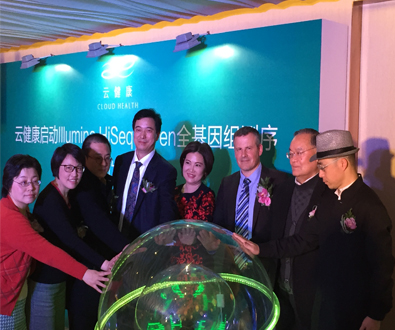
2015년 3월 31일
With a population approaching 1.4 billion people, China represents the largest market in the world for next-generation sequencing (NGS). Tim Orpin, general manager of the Asia Pacific Region for Illumina, speaks about the explosive growth opportunities for genomics and critical success factors for working in China.
How would you describe the genomics landscape in China?
Things move very quickly in China. Decisions on a national scale can be made relatively fast, especially where technology has the ability to add significant value to society. As a result, the genomics landscape in China is incredibly hot.
Historically, Illumina has built a strong reputation and excellent relationships in the country’s research market, with the major universities and service providers like BGI rapidly adopting our technology. Today, there’s a much stronger focus on using NGS technology in a manner that adds direct value to the population. Where there is a strong value proposition for society, we’ve seen the technology adopted extremely quickly when compared to uptake in other parts of the world. The widespread use of non-invasive prenatal testing (NIPT) is an excellent example of this.
However, the landscape is also becoming much more complex with the move into clinical applications. NGS is a new technology and regulatory authorities like the China Food and Drug Administration (CFDA) are moving fast to understand and implement a regulatory framework for NIPT and other clinical applications. Just today, in fact, Berry Genomics announced that their subsidiary Hangzhou Berry Genomics received premarket clearance from CFDA for the NextSeq CN500, a high throughput sequencing instrument developed with Illumina to meet Chinese clinical needs. They also received premarket clearance for their NIPT detection kit for trisomies 13, 18 and 21.
What applications are really growing right now?
The first application that comes to mind is population-scale sequencing programs and services. Illumina’s HiSeq X Ten, which enabled the $1,000 genome, has been strongly adopted inside China. Some of the earliest adopters of this technology include Novogene and WuXi PharmaTech. Most recently, Cloud Health has invested in this platform. There is a strong commitment to population-scale genomics as evidenced by rapid adoption of the X Ten.
We’re also seeing massive opportunities in oncology and believe that NGS has the ability to add significant value to cancer management in China. We are working to establish multiple partnerships in the oncology space, and we have initiated discussions with key stakeholders to establish a China Actionable Genome Consortium.
China also has one of the largest forensics markets in the world. The adoption of NGS to help solve crime presents a significant opportunity both to the forensics community in China and for Illumina.
At the end of the day, there are many different market opportunities, and China is similar to the rest of the world in that respect. Wherever you can demonstrate a real value to society, that is key to rapid adoption.
What are the biggest opportunities for growth?
I think the greatest growth areas are in clinical applications. Clinical use of NGS will be huge, whether it’s for reproductive health or oncology. There is also great potential in other areas such as infectious disease and outbreak monitoring, and food and environmental testing. Given the size of the population, adoption rates and market growth can be staggering.
What is unique about working in China?
It’s a complex market. Geographically, it is very large, the third largest in the world by that measure. The business networks can be relatively complex. To be successful, you have to have strong partnerships, from distribution networks to the level of the government. We aren’t a Chinese company, so to maximize our success, we need to build a really strong local presence and be seen as a company that truly operates inside China to support the needs of China, as opposed to being seen as an international company just selling products to China.
To that end, we have a significant focus on scaling up our infrastructure and investment inside the country. We currently have two offices – one in Beijing and one in Shanghai. We’ve been hiring a lot of people; we are growing our local team by 40 percent in 2015 alone. And we’ve recently appointed a new China Country Manager, Ruilin Zhao, to lead the China team.
We’re also continuing to build and grow our relationships. For example, Illumina has a manufacturing agreement with Berry Genomics. This partnership has enabled the rapid regulatory approval of our NextSeq 500 platform by the CFDA so that it is available for use in regulated markets inside China.
We are evaluating multiple other manufacturing agreements with partners that serve other key markets in China, as well as our own manufacturing options. At the same time, we are working very actively on our regulatory strategies and approvals across a number of platforms and applications. These are very closely related. How you manufacture is very closely tied to the regulatory path you can take with products.
Finally, we’re evaluating how to enhance the service that we offer to Chinese customers. As an example, it can take weeks to import spare parts and consumables into China and we are reviewing strategies to increase our inventory inside China to accelerate supply.
I first started working in China more than 25 years ago and the changes that I have witnessed, both in the society and the economy, are so profound that it is difficult to comprehend. In 1990, China produced less than 3-percent of global manufacturing output by value. Today, it is almost 25-percent and predicted to rise further. China represents Illumina’s most important growth market and we look forward to working with our partners to unlock the power of the genome and transform the genomics landscape in China.


